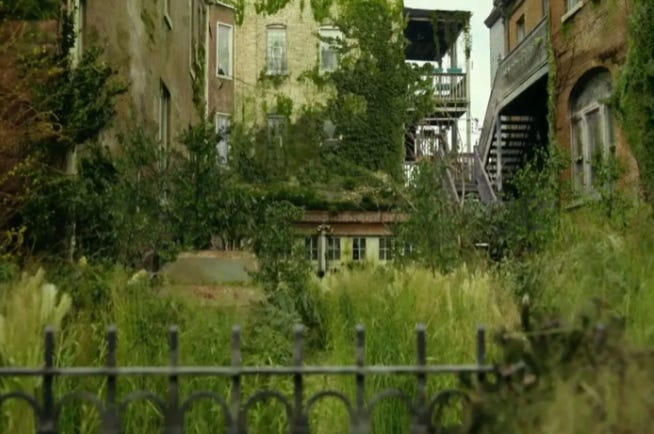Looking for New Beauty
This article was sent to the Blue Room newsletter last week. Subscribe if you’d like to receive articles like this directly to your inbox.
~
“Survival is insufficient.”
Recently I read an article about art that helps us endure the apocalypse. One work of art that’s been accompanying me lately is the HBOmax series Station Eleven, about what’s left behind after civilization collapses following a pandemic in which 99% of the population perishes. (Yes, I can’t believe I’m watching it either. I’m even reading the book! SMH.)
I’m still figuring out what the show is ultimately about, but it features a band of itinerant actors and musicians called the Traveling Symphony. The group tours around one of the Great Lakes, performing works of Shakespeare for the inspiration and edification of tiny communities who’ve somehow managed to survive for two decades “post-pan.” There’s some danger and turf stuff and a mysterious prophet whose motives are still unfolding mid-season, but one of the themes is the necessity of beauty for sustaining life. The above quote is from the show.
There is no Internet or even electricity post-pan. Everything you might call “infrastructure” has been annihilated. The show offers haunting glimpses of our modern world, what we would call “normal life,” now overgrown with vegetation. Here’s the house where one of the main characters lived pre-pandemic:
And post pandemic:
Watching a show like this, I can’t help but wonder how I would fare in such an apocalypse. How would I survive the eradication of modern medicine, technology, mass communication? That would be hard enough. But perhaps even more important, I would need to learn to find beauty in places I hadn’t been accustomed to seeing it… no longer in a new silk scarf, or a carefully-plated restaurant meal, or the music of Stevie Wonder, all of which would be gone. I would have to find beauty in decay, and in ragged resilient humanity. (Yes, the beauty of nature persists… but in Station Eleven, humanity’s relationship to the natural world is radically different post-pan. Whereas nature was once a refuge from modern life, it is now their constant habitat, containing dangers as well as delights.)
What would it take for me to be able to see beauty in so many new places? I’d need to be able to grieve and let go of what has been lost, including the things I once cherished as beautiful. It occurs to me that our ability to see the beauty in front of our faces depends in part on our not holding on to the way things once were, or “should” be now.
I’ve made no secret of the fact that the past few years have been tough on our family, though we’re certainly not alone in that. One of our children endured a fairly major depressive episode. That child is now thriving in college, in a blessedly World’s Okayest way. Meanwhile, pandemic hasn’t exactly been kind to the other two kids. Through all of this, my basic task as a parent has been to love what is, or at least to accept it. Having a depressed kid is hard enough; why make it harder by thinking it “shouldn’t” be? (This doesn’t mean we call it good, or roll over and let the depression have its way with us; rather, only by honestly receiving what life gives us can we start to heal, and maybe, maybe transform.)
Buddhist teaching distinguishes between pain and suffering: “Pain is an unavoidable aspect of the natural world,” writes Jack Kornfield. “[But] suffering is different from pain. Suffering is caused by our reaction to the inevitable pain of life.”
Suffering is a matter of intention; we can strive to detach from the attitudes that lead to suffering. I wonder if beauty is the other side of that spectrum. Like pain, beauty just is. It exists on its own terms. But beauty is also a matter of intention; it is a practice. We can seek to see the beauty in things… perhaps amid a depression, but also during a pandemic, and even when the world as we know it is coming to an end.
Whew! This is still quite a tangle for me, which is one reason I'll be featuring Station Eleven in an upcoming Hope Notes. Learn more and register here, and while you’re at it, you can listen to a replay of last week’s wonderful conversation about Encanto, featuring my friend and colleague Shannan Vance-Ocampo, who offered reflections on Colombian culture and history as expressed in the film. One of our best.
Speaking of Hope Notes, episode two of the Blue Room podcast is live: part one of last year’s conversation about Black Panther with writer and podcaster Derrick Weston. Part two will drop in a couple of weeks.
~
This article was sent to the Blue Room newsletter last week. To receive articles like this directly to your inbox, subscribe.




